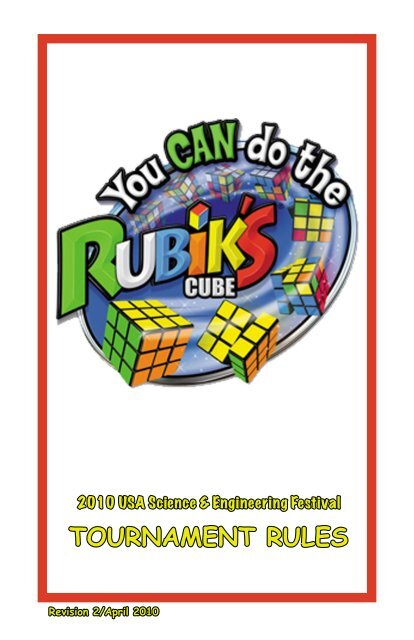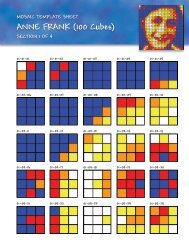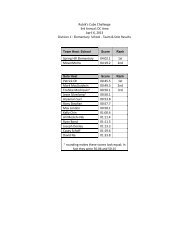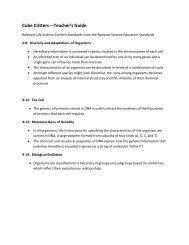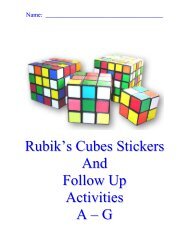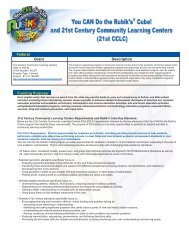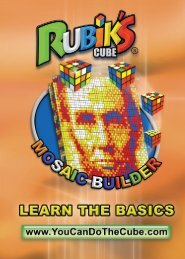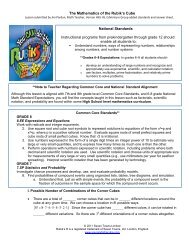TOURNAMENT RULES - You CAN Do the Rubik's Cube!
TOURNAMENT RULES - You CAN Do the Rubik's Cube!
TOURNAMENT RULES - You CAN Do the Rubik's Cube!
You also want an ePaper? Increase the reach of your titles
YUMPU automatically turns print PDFs into web optimized ePapers that Google loves.
2010 USA Science & Engineering Festival<br />
<strong>TOURNAMENT</strong> <strong>RULES</strong><br />
Revision 2/April 2010
GETTING STARTED<br />
Competition Date: Saturday, October 23,2010<br />
Preliminary: Thursday, October 21, 2010*<br />
The Tournament will consist of teams of eight, K-12 only, who will be<br />
competing for <strong>the</strong> fastest time to collectively solve 25 <strong>Rubik's</strong> <strong>Cube</strong>s.<br />
Contents:<br />
Section 1 - Eligibility<br />
Section 2 - Registration<br />
Section 3 - Organization<br />
Section 4 - General Rules<br />
Section 5 - <strong>Cube</strong>s<br />
Section 6 - Scrambling<br />
Section 7 - Tournament Procedure<br />
Section 8 - The “Solved” State<br />
Section 9 - Awards & Prizes<br />
* Preliminary Event – will be held on Thursday, October 21, 2010. However,<br />
depending upon <strong>the</strong> number of teams participating, preliminaries may run over<br />
two days beginning Wednesday, October 20, 2010.<br />
1
Section 1<br />
ELIGIBILITY<br />
Eligibility<br />
1. Open to all public, private, religious, home schools, libraries<br />
and o<strong>the</strong>r “Not for Profit” youth organizations with at least 25<br />
students or members that are currently enrolled in school (K-<br />
12) in <strong>the</strong> Greater Washington DC area including Delaware, <strong>the</strong><br />
District of Columbia, Maryland, Virginia and West Virginia.<br />
2. Home schools must be in compliance with <strong>the</strong> home school laws of<br />
<strong>the</strong>ir State to be eligible to participate.<br />
3. Participants must be enrolled in a school in <strong>the</strong> Greater Washington<br />
DC area including Delaware, <strong>the</strong> District of Columbia, Maryland<br />
Virginia and West Virginia at <strong>the</strong> time of <strong>the</strong> tournament (October<br />
2010). Thus all participants will be students.<br />
4. Each entity may enter one (1) team of eight (8) competitors per<br />
Division. (Division 1 will be Grades K-8 and Division 2 is Grades<br />
9-12)<br />
5. Division will be determined by <strong>the</strong> oldest team member on <strong>the</strong><br />
team. e.g. a K-12 school entering one team only, if <strong>the</strong> oldest<br />
member is 12th grade and <strong>the</strong> youngest 1st grade, this team would<br />
compete in Division 2. Alternatively, a K-12 school could enter a<br />
team in each division.<br />
6. A competitor may only be a member of one team.<br />
7. Any questions regarding eligibility should be directed to <strong>the</strong> <strong>You</strong><br />
<strong>CAN</strong> <strong>Do</strong> The Rubik’s <strong>Cube</strong> representative.<br />
2
Section 2<br />
REGISTRATION<br />
Registration:<br />
1. Registration is free. Each entity must complete and submit<br />
a registration form for each team by deadline to be eligible to<br />
participate in Tournament.<br />
2. Registrants must provide all required information.<br />
3. To register an entity must designate a teacher/coach. The<br />
teacher/coach must be over 21 years of age and will be <strong>the</strong> team<br />
contact.<br />
4. At <strong>the</strong> time of Registration it is not required to have <strong>the</strong> team<br />
members identified. However, complete information on <strong>the</strong> team<br />
members will be required no less than 30 days prior to <strong>the</strong> event.<br />
5. Failure to assemble a team by <strong>the</strong> deadline, or failure to attend<br />
<strong>the</strong> Tournament will result in automatic disqualification.<br />
6. All Competing teams must be available for both <strong>the</strong> preliminary<br />
tournament to be held on Thursday, October 21, 2010* at <strong>the</strong><br />
National Electronics Museum and <strong>the</strong> Grand Final on Saturday,<br />
October 23, 2010 on <strong>the</strong> National Mall in Washington DC.<br />
7. The top 6 teams from each division will become finalists and will<br />
advance to <strong>the</strong> Grand Finals.<br />
* Preliminary Event – will be held on Thursday, October 21, 2010. However,<br />
depending upon <strong>the</strong> number of teams participating, preliminaries may run over<br />
two days beginning Wednesday, October 20, 2010.<br />
3
Section 3<br />
ORGANIZATION<br />
Organization Team:<br />
1. <strong>You</strong> <strong>CAN</strong> <strong>Do</strong> The Rubik’s <strong>Cube</strong> representatives will be responsible<br />
for making arrangements before and during <strong>the</strong> tournament and<br />
ensuring that all participants have access to ei<strong>the</strong>r electronic or<br />
printed versions of <strong>the</strong>se regulations.<br />
2. <strong>You</strong> <strong>CAN</strong> <strong>Do</strong> The Rubik’s <strong>Cube</strong> representatives will be responsible<br />
for ensuring that any changes in <strong>the</strong> rules are made available to all<br />
registered competitors.<br />
3. <strong>You</strong> <strong>CAN</strong> <strong>Do</strong> The Rubik’s <strong>Cube</strong> representatives will be responsible<br />
for appointing all Officials for <strong>the</strong> tournament.<br />
4. Teachers, Coaches and Competitors will be required to assist with<br />
Judging, Scrambling and Scoring. Competitors will not judge or<br />
scramble <strong>the</strong>ir own cubes nor record <strong>the</strong>ir own scores.<br />
Officials:<br />
Main Judge:<br />
• Responsible for overseeing <strong>the</strong> entire tournament; making<br />
sure <strong>the</strong> rules are followed, making decisions on penalties and<br />
disqualification, and starting <strong>the</strong> tournament.<br />
Team Judge(s):<br />
• Responsible for executing <strong>the</strong> tournament procedures. These<br />
officials will be a Teacher/Coach from ano<strong>the</strong>r team.<br />
Scramblers:<br />
• Responsible for applying <strong>the</strong> scrambling sequence. These<br />
officials will be Competitors from ano<strong>the</strong>r team.<br />
(Scrambling = mixing up <strong>the</strong> cubes)<br />
Score Takers:<br />
• Responsible for registering <strong>the</strong> results. Team Judges will act<br />
as Score Takers.<br />
Teacher/Coaches:<br />
• Responsible for teaching <strong>the</strong> team to compete and making<br />
sure <strong>the</strong> competitors are aware of <strong>the</strong> rules.<br />
4
Section 4<br />
GENERAL <strong>RULES</strong><br />
GENERAL <strong>RULES</strong>:<br />
1. Competitors must obey venue regulations and conduct <strong>the</strong>mselves<br />
in a manner considerate of o<strong>the</strong>rs at all times during <strong>the</strong><br />
competition.<br />
2. Competitors must remain quiet when inside <strong>the</strong> designated<br />
competition area. Teams are permitted to talk amongst each o<strong>the</strong>r<br />
but any talking must be kept at a reasonable level and must not<br />
disturb o<strong>the</strong>r competitors. Teacher/coaches are not permitted<br />
to assist team, ei<strong>the</strong>r through instruction or by physically solving<br />
<strong>the</strong> cubes.<br />
3. Competitors must be fully dressed. Clo<strong>the</strong>s must not display<br />
vulgar language or have inappropriate pictures.<br />
4. No items whatsoever are allowed on <strong>the</strong> competition table(s)<br />
including cell phones, pagers, or any o<strong>the</strong>r electronic equipment.<br />
5. Use of notes or any form of reference material is not permitted.<br />
6. Competitors may sit or stand during <strong>the</strong> competition round(s).<br />
7. Disqualification: The main judge may disqualify a team and/or<br />
a single competitor or issue a warning for any of <strong>the</strong> following<br />
reasons:<br />
• Competitor is suspected of cheating or defrauding any<br />
officials of <strong>the</strong> competition.<br />
• Competitor behaves in a way that is unlawful, violent or<br />
indecent, or intentionally damages venue facilities or anyone’s<br />
personal property within <strong>the</strong> venue.<br />
• Competitor interferes or becomes a blatant distraction to<br />
o<strong>the</strong>rs during <strong>the</strong> competition.<br />
• Competitor refuses to abide by any of <strong>the</strong> rules as set forth<br />
for <strong>the</strong> competition.<br />
• Disqualification occurs immediately or after warning based on<br />
<strong>the</strong> nature of <strong>the</strong> infraction.<br />
• Any warning will result in a 2 second Competition penalty per<br />
incident.<br />
• In <strong>the</strong> event of any dispute, competitors must accept <strong>the</strong><br />
final ruling of <strong>the</strong> Main Judge.<br />
5
Section 5<br />
CUBES<br />
CUBES:<br />
1. The tournament requires <strong>the</strong> use of 3x3x3 Rubik’s <strong>Cube</strong>.<br />
2. Competitors should bring and use <strong>the</strong>ir own cubes. Competitors<br />
may borrow cubes from o<strong>the</strong>r teams although both must be ready<br />
to compete when called to do so.<br />
3. <strong>Cube</strong>s must be in reasonable working order, so that normal<br />
scrambling is possible.<br />
4. <strong>Cube</strong>s may be made smoo<strong>the</strong>r internally by sanding or using<br />
lubricant.<br />
5. No modifications are allowed that enhance <strong>the</strong> basic concept of<br />
<strong>the</strong> cube.<br />
6. Any modification to a cube that causes poor performance or<br />
results by a competitor are not grounds for additional attempts<br />
in <strong>the</strong> event. Poor performance = pieces popping apart, stickers<br />
falling off, cube rotation sticking, etc.<br />
7. <strong>Cube</strong>s must be clean and must not have any textures, markings,<br />
elevated pieces, damages, or o<strong>the</strong>r differences that distinguish<br />
one cube from a similar cube.<br />
8. <strong>Cube</strong>s must have only one logo and <strong>the</strong> logo must be on one of <strong>the</strong><br />
center-pieces. The cube must show one clearly distinct color per<br />
face in <strong>the</strong> solved state.<br />
9. Competitors are not allowed to bring any cubes into <strong>the</strong> competition<br />
area. Teacher/Coach maintains custody of cubes.<br />
6
Section 6<br />
SCRAMBLING<br />
SCRAMBLING:<br />
1. A Scrambler must apply <strong>the</strong> scramble sequences.<br />
2. Standard metric for scrambling and solving is Quarter Turn<br />
Metric (QTM).<br />
3. The number of moves to scramble a cube (a scramble sequence)<br />
from <strong>the</strong> solved state to scrambled state must be at least 25<br />
moves. A move is one 90˚ turn.<br />
4. <strong>Cube</strong>s must be scrambled with <strong>the</strong> white face on top and green on<br />
<strong>the</strong> front.<br />
5. <strong>Cube</strong>s must be scrambled before each round of a competition.<br />
Definition: Quarter Turn Metric = Where any turn of any face (i.e.<br />
any outer side of cube) by 90˚, clockwise or counterclockwise, counts<br />
as 1 move. A slice (i.e. inner or middle) turn counts as 2 moves for each<br />
90˚ turn.<br />
<strong>TOURNAMENT</strong> LAYOUT<br />
1<br />
2<br />
Scramble<br />
Table 1<br />
3 4<br />
5<br />
6<br />
8<br />
7<br />
1<br />
2<br />
Scramble<br />
Table 2<br />
3 4 5 6<br />
8<br />
7<br />
1<br />
2<br />
Scramble<br />
Table 3<br />
3<br />
4<br />
5<br />
6<br />
7<br />
8<br />
Tea m<br />
Judge<br />
Tea m<br />
Judge<br />
Tea m<br />
Judge<br />
Teacher/C oach<br />
Timer<br />
Teacher/C oach<br />
Timer<br />
Teacher/C oach<br />
Timer<br />
Table 1<br />
Table 2<br />
Table 3<br />
1<br />
5<br />
1<br />
5<br />
1<br />
5<br />
2<br />
6<br />
2<br />
6<br />
2<br />
6<br />
3<br />
7<br />
3<br />
7<br />
3<br />
7<br />
4<br />
8<br />
4<br />
8<br />
4 8<br />
7<br />
A U D I E N C E
Section 7<br />
PROCEDURE<br />
COMPETITION PROCEDURE:<br />
1. Team Judges make sure <strong>the</strong> procedures of <strong>the</strong> competition<br />
are followed. A Judge must call “PENALTY” at <strong>the</strong> time of <strong>the</strong><br />
infraction and such penalty should be noted.<br />
2. Scramblers scramble <strong>the</strong> cube(s) according to Scrambling<br />
procedure on Page 7.<br />
3. Score sheet is completed by Teacher/Coach and timers are tested.<br />
4. Team Judges do a quick cube count and general inspection to ensure<br />
thorough scrambling. If in doubt, scramblers must re-scramble.<br />
5. Main Judge calls teams to “get ready”. All members of <strong>the</strong><br />
competiting team must place <strong>the</strong>ir hands flat on <strong>the</strong> table. Team<br />
must not have any physical contact with <strong>the</strong> cubes until Teacher/<br />
Coach starts timer. Penalty for infraction: 2 seconds.<br />
6. Team Judges cover <strong>the</strong> cubes (use a sheet of paper or a cloth) and<br />
places <strong>the</strong> covered scrambled cubes on competition table.<br />
7. Main Judge inspects all tables to make sure everyone is ready<br />
and when satisfied, tells Teacher/Coach to start <strong>the</strong>ir timer when<br />
<strong>the</strong>y are ready to begin.<br />
8. As soon as <strong>the</strong> Teacher/Coach starts <strong>the</strong> timer, <strong>the</strong> team removes<br />
<strong>the</strong> cover and begins <strong>the</strong> solve. Penalty for infraction: 2 seconds.<br />
Simultaneously, <strong>the</strong> Team Judge should also start <strong>the</strong>ir stopwatch.<br />
9. When a team has solved all cubes and each team member has<br />
released all <strong>the</strong> cube(s) and placed <strong>the</strong>ir hands flat on <strong>the</strong> table,<br />
<strong>the</strong> Teacher/Coach and Team Judge stop <strong>the</strong>ir respective timers.<br />
10. Once <strong>the</strong> time is stopped, competitors must not touch or move <strong>the</strong><br />
cubes or timer until <strong>the</strong> Team Judge has inspected all <strong>the</strong> cubes<br />
and <strong>the</strong> time is recorded toge<strong>the</strong>r with any penalty on <strong>the</strong> score<br />
sheet. Penalty for Infraction: Disqualification.<br />
11. The score time is taken from <strong>the</strong> Teacher/Coach timer. However,<br />
if <strong>the</strong> Teacher/Coach timer has run out (Teacher/Coach Timers<br />
run for a total of 10 minutes), <strong>the</strong>n <strong>the</strong> Team Judge time is used.<br />
Teacher/Coach is responsible for telling Team Judge to stop<br />
timer.<br />
12. The Teacher/Coach initials <strong>the</strong> score and <strong>the</strong> Team Judge takes<br />
<strong>the</strong> score sheet to <strong>the</strong> Main Judge for recording.<br />
13. If <strong>the</strong>re is a dispute, no moves or alignments must be applied to<br />
<strong>the</strong> cube until <strong>the</strong> dispute has been settled, involving <strong>the</strong> main<br />
judge if needed. Penalty for Infraction: Disqualification.<br />
8
Section 8<br />
THE ‘SOLVED’ STATE<br />
SOLVED STATE:<br />
1. Only <strong>the</strong> resting state of <strong>the</strong> cube is considered when <strong>the</strong> timer<br />
has stopped.<br />
2. <strong>Cube</strong>s may be in any orientation at <strong>the</strong> end of <strong>the</strong> solve.<br />
3. All pieces must be fully attached to <strong>the</strong> cube and in <strong>the</strong>ir required<br />
positions.<br />
4. A cube is solved when all <strong>the</strong> face colors are reconstructed and all<br />
<strong>the</strong> parts are aligned within certain limits. A cube is considered<br />
solved if less than a 45˚ move is required. If one move is required<br />
of more than 45˚ <strong>the</strong>re is a 2 second penalty. If more than one<br />
move is required <strong>the</strong> cube is considered not solved.<br />
5. Examples:<br />
Solved - No Penalty<br />
Misalignment requires 1 face<br />
move =45˚<br />
Not Solved<br />
Misalignment requires 1 face and<br />
1 slice move >=45˚<br />
Not Solved<br />
Misalignment requires 2 face<br />
moves >=45˚<br />
Solved = no penalty<br />
All Misalignments
Section 9<br />
AWARDS & PRIZES<br />
AWARDS & PRIZES:<br />
1. Competitors should attend <strong>the</strong> winner’s ceremony to be eligible<br />
for awards and prizes, which will be held within one hour after <strong>the</strong><br />
end of <strong>the</strong> final round.<br />
2. Cash prizes are to be used by winning organization to enhance<br />
Math and/or Science education efforts.<br />
3. The winning team members each receive a trophy and <strong>the</strong> Teacher/<br />
Coach accepts a trophy and prize money on behalf of <strong>the</strong> winning<br />
organization.<br />
4. Winners of awards or prizes should be prepared to talk to<br />
journalists or any media covering <strong>the</strong> competition.<br />
PRIZES:<br />
DIVISION 1- GRADES K-8<br />
1st Prize - $1,000<br />
2nd Prize - $750<br />
3rd Prize - $450<br />
4th Prize - $100<br />
5th Prize- $100<br />
6th Prize- $100<br />
DIVISION 2 - GRADES 9-12<br />
1st Prize - $1,000<br />
2nd Prize - $750<br />
3rd Prize - $450<br />
4th Prize- $100<br />
5th Prize - $100<br />
6th Prize - $100<br />
10
MATH EDUCATION KIT<br />
The <strong>You</strong> <strong>CAN</strong> <strong>Do</strong> The Rubik’s <strong>Cube</strong> provides a Math Education<br />
Kit available at www.<strong>You</strong>Can<strong>Do</strong>The<strong>Cube</strong>.com at a special<br />
discounted price (1 kit - $49.99, 2 - $79.99 and 3 - $99.99) for<br />
Registrants of <strong>the</strong> Tournament. The kit includes 12 Rubik’s <strong>Cube</strong>s,<br />
Solution Guides, and an instructional CD with math lessons and<br />
activities that have been designed and piloted by teachers and<br />
educational consultants for classroom use at varying grade levels.<br />
These lessons are aligned with national standards, curriculum<br />
frameworks in 50 States and 21st Century Skills. Kit materials<br />
can be downloaded (without cubes) for free. Kits can be ordered<br />
online at www.<strong>You</strong>Can<strong>Do</strong>The<strong>Cube</strong>.com using promo code USATEN.<br />
Alternatively, you can download an order form.<br />
www.<strong>You</strong>Can<strong>Do</strong>The<strong>Cube</strong>.com<br />
<strong>You</strong> Can <strong>Do</strong> The Rubik’s <strong>Cube</strong><br />
©2010 Seven Towns Ltd.<br />
RUBIK’S® is a registered trademark of Seven Towns, Ltd., London, England


